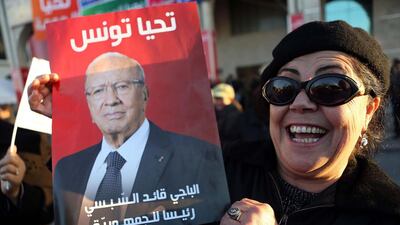Tunisia’s presidential election shows the transitional period that followed its revolution is over. Political veteran Beji Caid Sebsi won just over 55 per cent of the vote, earning a five-year term as Tunisia’s leader.
The Sharjah-based daily Al Khaleej’s editorial noted the years that had passed since the revolution, adding: “They were by no means easy, but the Tunisian people were able to survive with the least possible amount of losses, despite malicious attempts by Ennahda, the Muslim Brotherhood’s branch in Tunisia, to undermine their achievements.”
Through the president’s electoral mandate, Tunisia is laying the foundations of a new phase. This does not promise to be easy but it is a period that calls for tremendous efforts and enormous sacrifices to address various social, economic and security issues.
“Most notable is the unemployment issue, especially among youth and the educated classes, which have spiralled to unprecedented figures and necessitate urgent remedial plans,” the editorial stated.
In addition to the stifling economic crisis, soaring prices and the spread of poverty, the lack of job opportunities is the most pressing concern for the young Tunisians who took to the streets at the onset of the revolution. Terrorism, too, comes to add to the new Tunisian regime’s agenda. It threatens to undermine the country’s stability and addressing it adequately calls for plans, capabilities and coordination with regional countries.
In the pan-Arab daily Al Hayat, the columnist Elias Harfoush said observers have every right to worry about the Tunisian experience, “this unique single experience in the series of experiences since the beginning of the Arab Spring in 2010”.
He noted many reasons for optimism: transparent elections, a relatively more moderate political Islam movement, and a non-politicised army. These all give cause to believe in a positive future for Tunisia, the writer suggested.
Developments in the country suggest the political system will resemble the one Mohamed Bouazizi was dreaming of on that fateful December morning four years ago when he set himself on fire, becoming the spark that lit the popular uprising.
“Nonetheless, we worry. When it comes to democratic transition experiences in our Arab countries, we have come to anticipate disappointment,” he wrote.
“And since Tunisia is in the heart of the storm of change, and many of its youth are no strangers to extremist ideologies and actions, Tunisia’s politicians will have to exert exceptional efforts to agree on a common ground from whence they could lead their country to success.”
With the president-elect aged 88, “one needs a substantial measure of optimism to see him as a symbol of the revolution and a source of hope for youth,” he observed.
Mr Caid Sebsi’s long association with former presidents Habib Bourguiba and Ben Ali also means forging a constructive relationship with Tunisia’s Islamists, who fought those regimes for years, is going to be a challenging task.
Translated by Racha Makarem
rmakarem@thenational.ae

